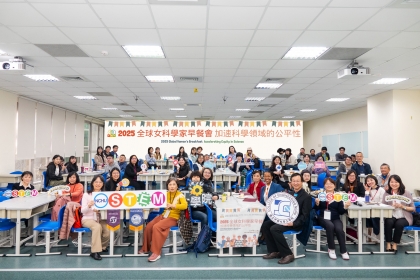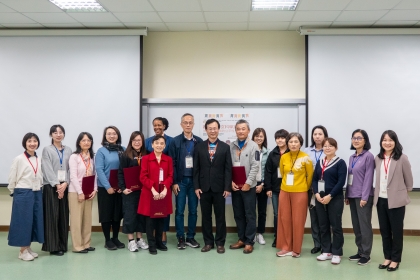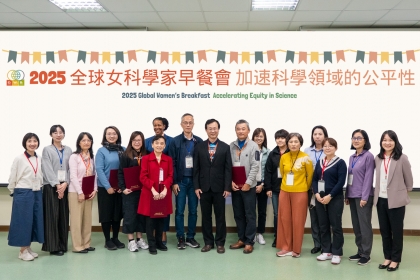National Chung Hsing University hosts the Global Women's Breakfast (GWB)
2025-02-12
興新聞張貼者
Unit秘書室
1,337
Source: School of Engineering, National Chung Hsing University (NCHU), Taiwan
The Global Women's Breakfast (GWB), initiated by the International Union of Pure and Applied Chemistry (IUPAC), has become an important annual event in the scientific community. This year, more than 380 breakfast meetings were held worldwide from New Zealand to Hawaii on February 11, with more than 30,000 people participating in discussions. The only event in Taiwan is held at the Applied Science and Technology Building of National Chung Hsing University. With the theme of "Accelerating Equity in Science," it is committed to promoting diversity and inclusion and ensuring that people of different backgrounds, genders, and socioeconomic statuses have equal access to science education, resources, and career development opportunities.
This event was co-organized by the National Chung Hsing University College of Engineering, the Chemical Society Located in Taipei (CSLT), the Taiwan Women in Science and Technology (TWiST), and the International Union of Pure and Applied Chemistry (IUPAC), and partially sponsored by the National Science and Technology Council (NSTC), Taiwan. It attracted more than 80 people from academia, research institutions, and industry to discuss how to create a more open scientific and technological environment.
In his opening speech, Ming-der Yang, dean of the College of Engineering at National Chung Hsing University, emphasized that diversity and fairness should be embraced in the scientific field to attract more talents to invest in scientific research and innovation and promote social progress. Dr. Mary Garson, IUPAC vice president, delivered a video message calling the global scientific community to work together to promote gender inclusion, break traditional frameworks, and create a more equitable academic environment. Chao-Ping Cherri Hsu, vice president of TWiST, and Ito Chao, secretary-general of CSLT, shared specific actions taken by Taiwan's academic community to promote gender equality and encouraged women to actively participate in scientific and technological innovation.
This event invites four experts from academia and industry to share their experiences and insights. Li-Cheng Hsieh, director of the Department of Bio-industrial Mechatronics Engineering at NCHU, has long been concerned about gender equality on campuses at all levels. He has served as a member of the Gender Equality Education Committee of the Ministry of Education and the Vice President for Student Affairs at NCHU, promoting relevant policies. He emphasized the key role of the educational environment in raising gender awareness and creating equal opportunities. Professor Ya-Fen Wang from the Department of Environmental Engineering of Chung Yuan University was a former deputy director of the Taiwan Governmental Environmental Protection Administration and has long been involved in environmental policy and sustainable development planning. She discusses the influence of female scientists in decision-making and emphasizes the importance of increasing female participation in global environmental issues.
Dr. Phaedria Marie St. Hilaire, who comes from the life sciences industry and is a DEIB (Diversity, Equity, Inclusion and Belonging) consultant, venture investor and industry leader, used the topic "Navigating Careers in STEM from a Gender Equality Perspective: 10 Lessons for a Successful Career" to share career development strategies in the STEM field, analyze the challenges of gender inequality, and provide specific suggestions to help women break through limitations and create successful careers. Rainie Lin manager of the diffusion process department of Micron Taiwan, shared her experience in the semiconductor industry with the theme of "Women in Tech" and analyzed the development opportunities and challenges for women in the technology industry. She emphasized the benefits of diverse teams for corporate innovation and encouraged women to actively participate in the technology field and give full play to their professional advantages.
There was a lively discussion at the event, and the participants had in-depth exchanges on the achievements of promoting gender equality, diversity, and inclusion in various fields. They all agreed that gender equality is related to personal rights and interests and the key to improving scientific research innovation and competitiveness. This Global Women's Breakfast (GWB) for female Scientists provides a valuable communication opportunity, allowing participants to gain academic and industrial insights and a deeper understanding of the importance of equity and inclusion.
The Female Teachers Committee of the College of Engineering of NCHU planned and organized this event. The current president, Chia-Ying Chen, from the Department of Environmental Engineering, and the former president, Chian-Hui Lai, director of the Institute of Biomedical Engineering (currently deputy leader of activities of CSLT), jointly coordinated the planning. Professor Shu-Hui Chen of National Cheng Kung University (leader of the Women’s Working Group of CSLT) and others attended the meeting, which promoted cross-sector cooperation and made the event successfully held. In the future, the scientific community will continue to work together to create a more open environment, allowing all talents to develop their talents and jointly promote global scientific and technological development towards a more equitable and diverse future.
The Global Women's Breakfast (GWB), initiated by the International Union of Pure and Applied Chemistry (IUPAC), has become an important annual event in the scientific community. This year, more than 380 breakfast meetings were held worldwide from New Zealand to Hawaii on February 11, with more than 30,000 people participating in discussions. The only event in Taiwan is held at the Applied Science and Technology Building of National Chung Hsing University. With the theme of "Accelerating Equity in Science," it is committed to promoting diversity and inclusion and ensuring that people of different backgrounds, genders, and socioeconomic statuses have equal access to science education, resources, and career development opportunities.
This event was co-organized by the National Chung Hsing University College of Engineering, the Chemical Society Located in Taipei (CSLT), the Taiwan Women in Science and Technology (TWiST), and the International Union of Pure and Applied Chemistry (IUPAC), and partially sponsored by the National Science and Technology Council (NSTC), Taiwan. It attracted more than 80 people from academia, research institutions, and industry to discuss how to create a more open scientific and technological environment.
In his opening speech, Ming-der Yang, dean of the College of Engineering at National Chung Hsing University, emphasized that diversity and fairness should be embraced in the scientific field to attract more talents to invest in scientific research and innovation and promote social progress. Dr. Mary Garson, IUPAC vice president, delivered a video message calling the global scientific community to work together to promote gender inclusion, break traditional frameworks, and create a more equitable academic environment. Chao-Ping Cherri Hsu, vice president of TWiST, and Ito Chao, secretary-general of CSLT, shared specific actions taken by Taiwan's academic community to promote gender equality and encouraged women to actively participate in scientific and technological innovation.
This event invites four experts from academia and industry to share their experiences and insights. Li-Cheng Hsieh, director of the Department of Bio-industrial Mechatronics Engineering at NCHU, has long been concerned about gender equality on campuses at all levels. He has served as a member of the Gender Equality Education Committee of the Ministry of Education and the Vice President for Student Affairs at NCHU, promoting relevant policies. He emphasized the key role of the educational environment in raising gender awareness and creating equal opportunities. Professor Ya-Fen Wang from the Department of Environmental Engineering of Chung Yuan University was a former deputy director of the Taiwan Governmental Environmental Protection Administration and has long been involved in environmental policy and sustainable development planning. She discusses the influence of female scientists in decision-making and emphasizes the importance of increasing female participation in global environmental issues.
Dr. Phaedria Marie St. Hilaire, who comes from the life sciences industry and is a DEIB (Diversity, Equity, Inclusion and Belonging) consultant, venture investor and industry leader, used the topic "Navigating Careers in STEM from a Gender Equality Perspective: 10 Lessons for a Successful Career" to share career development strategies in the STEM field, analyze the challenges of gender inequality, and provide specific suggestions to help women break through limitations and create successful careers. Rainie Lin manager of the diffusion process department of Micron Taiwan, shared her experience in the semiconductor industry with the theme of "Women in Tech" and analyzed the development opportunities and challenges for women in the technology industry. She emphasized the benefits of diverse teams for corporate innovation and encouraged women to actively participate in the technology field and give full play to their professional advantages.
There was a lively discussion at the event, and the participants had in-depth exchanges on the achievements of promoting gender equality, diversity, and inclusion in various fields. They all agreed that gender equality is related to personal rights and interests and the key to improving scientific research innovation and competitiveness. This Global Women's Breakfast (GWB) for female Scientists provides a valuable communication opportunity, allowing participants to gain academic and industrial insights and a deeper understanding of the importance of equity and inclusion.
The Female Teachers Committee of the College of Engineering of NCHU planned and organized this event. The current president, Chia-Ying Chen, from the Department of Environmental Engineering, and the former president, Chian-Hui Lai, director of the Institute of Biomedical Engineering (currently deputy leader of activities of CSLT), jointly coordinated the planning. Professor Shu-Hui Chen of National Cheng Kung University (leader of the Women’s Working Group of CSLT) and others attended the meeting, which promoted cross-sector cooperation and made the event successfully held. In the future, the scientific community will continue to work together to create a more open environment, allowing all talents to develop their talents and jointly promote global scientific and technological development towards a more equitable and diverse future.




